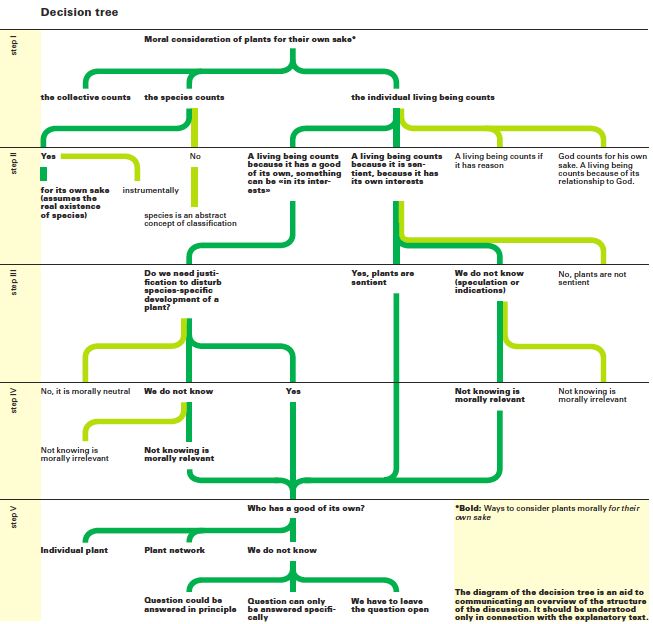 The Swiss Federal Ethics Committee on Non-Human Biotechnology (ECNH) and the citizens of Switzerland were awarded the 2008 Ig Nobel Peace Prize for adopting the legal principle that plants have dignity. The report isn’t very long; here follow its (not necessarily unanimous) conclusions, along with a decision tree that illustrates their reasoning process.
The Swiss Federal Ethics Committee on Non-Human Biotechnology (ECNH) and the citizens of Switzerland were awarded the 2008 Ig Nobel Peace Prize for adopting the legal principle that plants have dignity. The report isn’t very long; here follow its (not necessarily unanimous) conclusions, along with a decision tree that illustrates their reasoning process.
Despite the Ig Nobel context, this is serious work, and the report is worth reading.
The Dignity of Living Beings With Regard to Plants. Moral Consideration of Plants for Their Own Sake”
1. Arbitrariness:
The Committee members unanimously consider an arbitrary harm caused to plants to be morally impermissible. This kind of treatment would include, e.g. decapitation of wild flowers at the roadside without rational reason.2. Instrumentalisation:
For the majority the complete instrumentalisation of plants – as a collective, as a species, or as individuals – requires moral justification.3. Ownership of plants:
For the majority here too, plants – as a collective, as a species, or as individuals – are excluded for moral reasons from absolute ownership. By this interpretation no one may handle plants entirely according to his/her own desires. A minority concludes that no limits apply to handling plants insofar as they are property.4. Genetic modification:
According to the majority position, there is nothing to contradict the idea of dignity of living beings in the genetic modification of plants, as long as their independence, i.e. reproductive ability and adaptive ability are ensured. Social-ethical limits on the genetic modification of plants may exist, but are not the object of this discussion.5. Patenting:
For the majority the ethical justification of patenting plants is a question of social ethics. It is not one involving the consideration of plants for their own sake and therefore not the object of this discussion either. For a minority the patenting of plants as such is morally impermissible and contradicts the dignity of living beings with regard to plants.6. Diversity:
Genetic modification of plants should, in the majority opinion, always involve consideration of conserving and safeguarding the natural, i.e. not man-made, network of relationships.7. Proportionality:
A majority considers any action with or towards plants that serves the self-preservation of humans to be morally justified, as long as it is appropriate and follows the principle of precaution.
